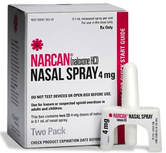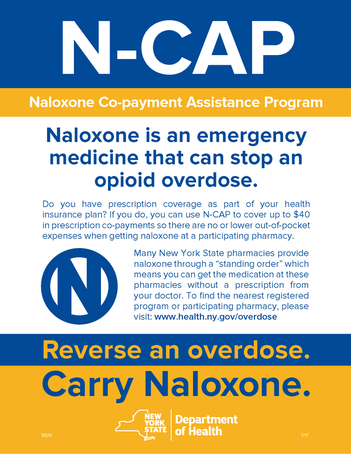Narcan Training
|
Narcan (also known as naloxone) is a medication that can reverse an overdose caused by an opiate drug. Narcan blocks opiate receptors in the brain, stopping an overdose and restoring breathing within two to eight minutes. It gives those in danger of dying from an overdose the chance to get the treatment and services they need to survive.
|
Southern Tier Overdose Prevention Program (STOPP), a program of Southern Tier Health Care System, offers free Narcan training to non-EMS firefighters, basic life support first responders, members of law enforcement and the friends and family members of those most likely to suffer an overdose from heroin and prescription opiates like oxycodone.
To view upcoming trainings, schedule a training or learn more about Narcan, contact Southern Tier Health Care System at (716) 372-0614 or visit the STOPP website at http://www.sthcs.org/narcan-training.html.
Narcan at Your Local Pharmacy
|
Narcan is also available at many local pharmacies. You do not need a prescription to obtain Narcan from a pharmacy. Simply ask for Narcan at the pharmacy counter. All Medicaid Managed Care Plans cover at least one formulation of Narcan and many private insurance plans also cover Narcan. The Naloxone Co-payment Assistance Program (N-CAP) will cover the costs of co-payments for naloxone up to $40. This means Narcan can be obtained with little or no out of pocket costs. There is no need to enroll in this program.
Additional information about N-CAP and a list of pharmacies that provide Narcan without a prescription can be found at www.health.ny.gov/diseases/aids/general/opioid_overdose_prevention/directories.htm |
Signs and Symptoms of an Opioid Overdose
An opioid overdose is a life-threatening event. If you believe you are witnessing an opioid overdose call 911 immediately.
|
|
New York State 911 Good Samaritan Law
Some individuals may fear that police will respond to a 911 call and there will be criminal charges for themselves or for the person who overdosed. Those fears should NEVER keep someone from calling 911 immediately. It may be a matter of life or death.
In September 2011, the 911 Good Samaritan Law went into effect to address fears about a police response to an overdose. This law provides significant legal protection against criminal charge and prosecution for possession of controlled substances, as well as possession of marijuana, drug paraphernalia and underage drinking. This protection applies to both the person seeking assistance in good faith as well as to the person who has overdosed. Class A-1 drug felonies as well as sale or intent to sell controlled substances are not covered by the law.
In September 2011, the 911 Good Samaritan Law went into effect to address fears about a police response to an overdose. This law provides significant legal protection against criminal charge and prosecution for possession of controlled substances, as well as possession of marijuana, drug paraphernalia and underage drinking. This protection applies to both the person seeking assistance in good faith as well as to the person who has overdosed. Class A-1 drug felonies as well as sale or intent to sell controlled substances are not covered by the law.

